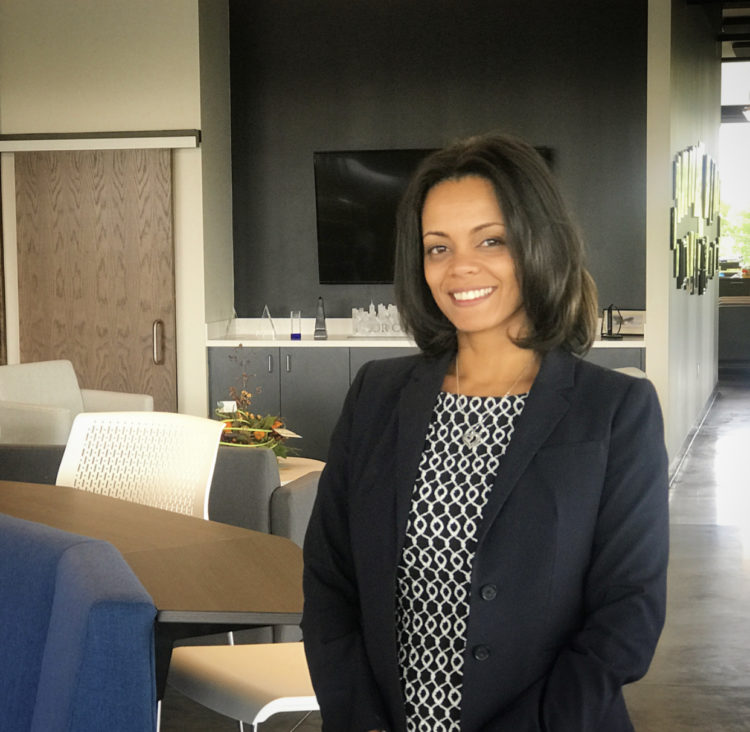
The Coffee Shop: THOR Companies
The Cup: Damaris brewed us a special treat – a smooth, rich cup of Brazilian coffee, from her private office stash!
The Connection: My friends are always looking out for me. When my pal Ericka came back from the TEDx Minneapolis event recently, she was adamant I must meet and interview two of the speakers. Damaris was one of those people! Ericka promised a story that would give me goosebumps and inspire me in ways I couldn’t anticipate. And she was completely right!
Before we get into Damaris’ remarkable story, let’s cover a few:
Common Grounds
How did you make your first buck? I worked at 13 full time. My aunt had an iron cutting firm. I was working in the office – cleaning, cooking lunch for the guys, washing bathrooms, going to the bank. I worked from 8am-5pm, then went to school from 7-11pm. I had to take a bus, a train and another bus. I left home at 6am and got to bed at midnight. I’ve worked ever since then.
What book should be required reading for everyone? The New Jim Crow by Michelle Alexander. Took me two years to finish because of the intensity of the information. I had to stop reading it and take a break because the bitterness was too much. That book changed me.
What’s something you hate paying for? There’s nothing I pay for that I hate paying for, but I think I’d hate paying for school if I had to.
What’s a food you can’t live without? Used to be Brazilian food, but now I’d say it’s Thai. Thai food is so good. But two Brazilian foods I can’t live without are Feijoada (a stew of black beans with pork) and Moqueca (fish stew). If you want a Brazilian dining experience in Minneapolis, Damaris recommends Samba in Hopkins.
What’s your guilty pleasure? Sleep. I never get enough of it – especially with a five year old.
What’s something you’re ridiculously good at that might surprise people? Event planning. I’m very good at fundraising and planning events like that. I founded the Minnesota National Organization of Minority Architects. I learned through that experience I was really good at it and I had zero problems asking for money.
The People We Meet
At the young age of seven, Damaris decided what she wanted to be when she grew up and has spent the years between then and now working toward, realizing and living that dream. Damaris tells the story: “When I was 7, I met an architect. She was very different. We lived in inner-city Brazil. The neighborhood was low income and mostly people of color. This woman came to the house. She was young with long blond hair, blue eyes and she was a career woman. So I looked at her and she looked like everything different. She was meeting with my dad and mom, so to me, she had power. And she was very pretty – like a TV princess. I saw all that in her and I wanted to be like her. At that point, I said I was going to be an architect.”
Following A Dream
“I didn’t even know what an architect did, but I asked my dad what it would take. My dad told me I’d have to go to college. We had no money for college, but I made my dad go get me brochures for colleges, which he did. He kept them in his nightstand drawer and I’d go in his room and flip through them. I went to a technical high school and studied design and then I went to University of Sao Paulo. It was free, but to get in was very difficult. It took me three trials. I was 21 when I started, the same age as most people who were finishing.”
“As soon as I got in, I started hearing about these exchange programs, and started looking for scholarships. I didn’t speak English, so I typed my letters in Portuguese and I had a classmate who knew English pretty well. Most of them did. Most were middle class or higher and they had been spending summers in Europe since they were little. They knew three or four languages. My friend translated the letter for me and I sent letters to over 50 schools, mostly in England, asking for a scholarship to go and study. I needed the trip, my visa, tuition, and housing all paid for. I remember my mom’s excitement when I started receiving letters back. They were all rejection letters, but she was excited that they wrote back. She thought it was such a nice, respectful thing to do. She still has a pile of those letters.”
In her last year of school, Damaris saw a banner on campus announcing that Arizona University was offering four scholarships for students to go for a semester. Two were full rides and paid for the trip, tuition, housing and books. The other two only paid for tuition, books and housing. You just needed to write an essay and send in an application. Oh, and you needed to speak English.
Language Barrier
Damaris shared with me, “I didn’t know English, but I told my mom, ‘It’s too much of what I need and want for it to not be for me. So I’m going to go for it.'” She wrote her essay (again having a friend translate for her), filled out the application, and submitted all the design portfolio requirements. She was at work when she got the news that she’d gotten 3rd place. She recalls, “I was doing an internship in the planning department at the university and I told my co-worker I got 3rd place. She was excited but I told her I couldn’t go because I had to pay for my own trip. She called the Director of Planning who was also President of the foundation. She said let’s talk to him and I think he can help.” Her co-worker went in to talk with him first and shortly after they called Damaris in. He said ‘Congratulations!’, and then surprised her by saying they were going to cover the cost of the trip.
Only that one little snag in what would otherwise be a huge time of celebration. That darn English. With her friend translating her essays and helping with her applications, no one was aware that she didn’t speak English. The final step before setting off for Arizona was an interview with all the scholarship winners and a representative from the university. And Damaris was terrified that after all her hard work, she was about to be “found out”.
Damaris says, “I called my mom and said I’m about to go upstairs to a dinner and meet this guy and that’s going to be the end of it. He’s going to find out I don’t speak English. My mom said, “Just pray and then go upstairs.”
“I prayed and went upstairs,” she said. Much to Damaris’ surprise, when the man arrived he explained to the group that he’d been traveling for weeks, and was exhausted. He wondered if it would be OK with everyone if they spoke in Spanish, instead of English. He was Argentinian and explained it would be easier to speak in Spanish/Portuguese, than to try to use English all night. What a relief!
Crash Course
Although she didn’t speak it when she arrived, within two to three months she was well on her way to proficiency in English. She explained, “My Brazilian classmates and I lived in the same house, and they knew I needed to learn English, so they refused to speak to me in Portuguese. I had a pounding headache every day! But I had to learn.”
Damaris ended up staying for the summer after her semester was over. Her classmates, who had no issues with spending money, travelled every weekend. She had an American classmate who noticed that she never travelled with her friends and asked her why. She says, “I told him being there was enough, but also, I didn’t have money. He asked me if I wanted to make some money and explained that there was a guy who needed help with AutoCAD. I ended up working for him and then I was able to travel…and eat.” From this connection, Damaris was connected with an architect who was late on a bunch of deadlines for some engineers. She was able to help him get caught up, and that got the attention of the main engineer who said he was so impressed, he wanted to meet her. Damaris explains, “He thanked me for helping them get caught up and explained they were so behind they weren’t getting paid on jobs. He was really appreciative!”
Land of Opportunity
After the summer, Damaris went back to Brazil, but, as she explained, “I knew I wanted to be an architect in the United States. So I finished my thesis and finished school and then came back to the US with a tourist visa. I knew I had six months before the visa expired to find a job and get a sponsorship visa. I said that after six months, if I don’t get a job in architecture – nothing else, I’ll just go back because I knew I could do well in Brazil.” She was five months in, with no promise of a job, when one of the guys from the team she helped stopped her on campus and told her the guy she’d helped was hiring. Damaris sent her resume and he immediately asked her to come in for an interview.
Damaris explained, “The only way for me to stay was to go back to school and get an F-1 visa which would allow me to go to school and work part time. But I didn’t have money for school. I was smart enough that I had applied for grad school at ASU and got accepted. So I did have plan B. But I had to tell him, ‘I need you to pay my tuition and pay me a salary.’ He said he’d have his assistant give me a call. He was one of the sweetest guys you’ll ever meet, but I really didn’t expect to get a call. I would have never been so honest about what I would need if I thought he would actually do it. Two days later I got a call that they had everything all set up and told me to go ahead and register for school. They asked, “Can you start Monday?”
Which I did and I worked for them for 9 years. I was so grateful! They paid for two years of school, paid me a salary, took care of my visa, paid for an immigration attorney. After six years in Phoenix I transferred here to Minnesota and I found the dynamics were so different – it was like starting over. I saw myself retiring there, so it was hard to leave – because of the gratitude I had, and still have for them. They didn’t have to do any of what they did for me. My mom calls that “favor”. I had so much favor. It took me two years to leave, but one day my manager told me, “You have given us back enough.”
Living the Dream
Damaris made a few transitions before finding herself in what she considers the absolute perfect job for her. She says, “I met Ravi (THOR CEO) and he shared his vision for what THOR was doing. I came here two years ago and that was the best decision I ever made.” Damaris explains that in her role as Vice President of THOR Design Plus she gets to put everything she’s learned, and everything she knows instinctively together to create accessible and inclusive spaces where everyone feels welcome and able to perform at their highest level. One of the projects she’s most proud of is the one we sat in for our coffee – THOR Companies new offices. After leaving a space that was, well, less than inspiring, Damaris designed the new and improved offices. She gave me a tour and I was so impressed how it was designed for every work style, was full of natural light, and the aesthetic was open and pleasing. It’s the kind of place you’d want to work and collaborate with your peers. Damaris says the grand opening, just over a month ago, was a very emotional and significant event for her personally. It was a crowning achievement. And she’s just getting started!
Another significant event Damaris shared with me was her citizenship ceremony on Sept. 11th. She explained that she’s been a permanent resident for over eight years, but after the last election, it became more important for her to have a voice and cast a vote. Also, professionally, it became an important factor. Because of the significance of the date of the ceremony, it was much bigger than average. There were 875 new Americans that day. Damaris says, “It was more emotional than I thought it would be. When they started reading all the countries of the people who were there, then reading the pledge – it was so emotional.”
“It got me thinking about what America is to me. I had friends in college tell me I was living the American dream more than they were. America is such a blessing to me. It brought me from the inner city of Sao Paulo all the way to where I am now. All because I came here. Truly the American dream. It’s the land of opportunity. For someone with the kind of drive I have, America pays off at such a higher rate than other countries. It’s something people take it for granted. If I had worked this hard in Brazil, I’d only have half of what I have and I’d be living in fear. When my parents visit, it takes a few days for them to get comfortable. But after some time here, they feel so relaxed. You don’t know how stressed you are until you get away from it. It’s like design. You don’t realize its impact until you work somewhere else, or see something different. Life is much different when you’re not living with constant tension.”
Keeping Faith
Damaris juggles a lot of projects and has several leadership roles, so I wonder how she manages to keep it all together. She explains, “I’m grounded in my faith. It’s a knowing. If things are really good – I know why. And if things are really bad, I know it will be ok. Even when I was first here and struggling, I never starved. I know that God’s got me and it’s a comfort. I have always been taken care of. I have a lot of favor. You have to do your part – you have to work. But God’s got you.”
If she had 30 seconds to make a speech to the world, Damaris says, “I’d talk about how we have more in common than we have differences. When we somehow are able to see through the layers, to the person, we’re most likely going to like each other. Once you know that, you can see that the rest is just wrapping. If we spent time meeting the person first, we’d wonder why we worry so much about the differences. Just love each other.”
Into Action
- Damaris’ story points to the importance people play in our stories. Along the way, she had people help her, provide opportunities, push her to learn and grow. And I think it’s worth recalling in our own lives – who are the people who helped us get where we are?
- Giving back is huge for Damaris. She has never forgotten the importance generosity has played in her life. She has a servant leadership mentality – mentoring and supporting people every chance she gets. Think about ways you can help someone in their career or business. Mentoring is a great way. But even something as easy as leaving a review online when you’ve had great service. Or sending a thank you note to someone who wouldn’t expect it (your tax preparer, dentist, hairdresser, etc). You might even send a note to the supervisor of someone who went above and beyond. Recognition and compliments are free – so give them freely!
- Hearing Damaris talk about living the American dream made me recognize that I definitely take the opportunities afforded to me for granted. If you live in a country where you have opportunities and don’t have to live in daily fear, you might want to join me in spending time every day being grateful for that. And recognizing how different life could be, and is, for so many people.
- Celebrate our sameness! As Damaris says, we have so much more in common than we have differences. Celebrate that and then get to know someone more deeply. Eventually, differences will arise. Celebrate those too! It is much easier to accept people as they are when we start with what we have in common. We all want to be happy. Live a life of purpose. And to love and be loved. The rest – it’s just wrapping!
Until next time, wonderful friend – be well, love big and stay curious! xo

